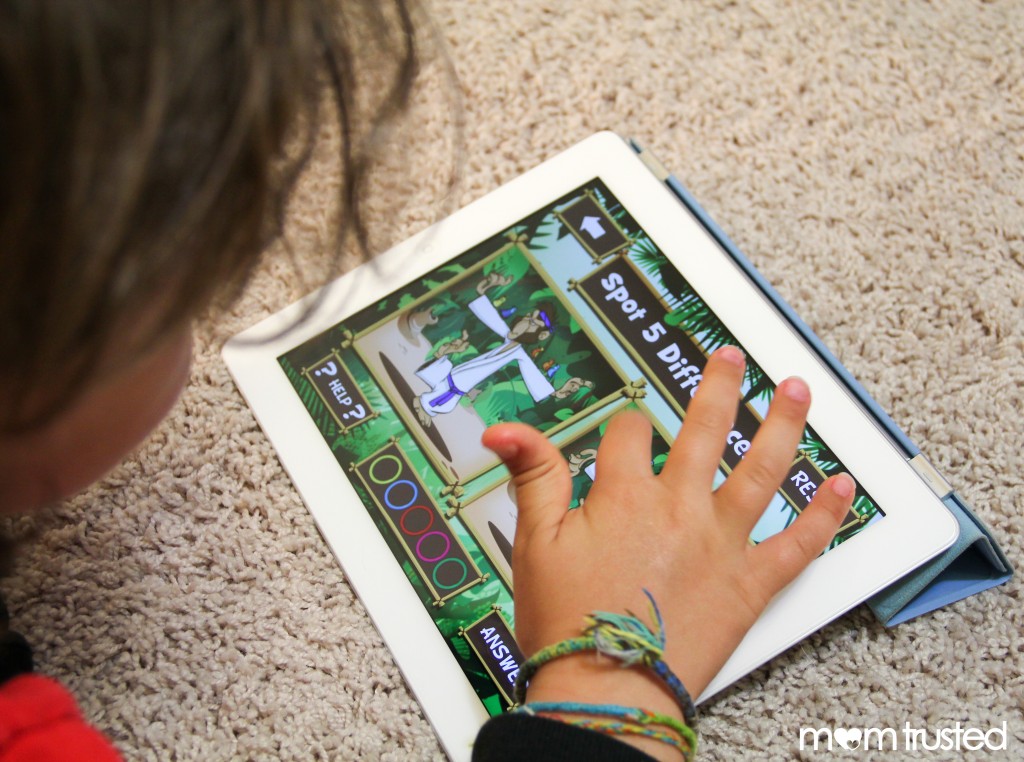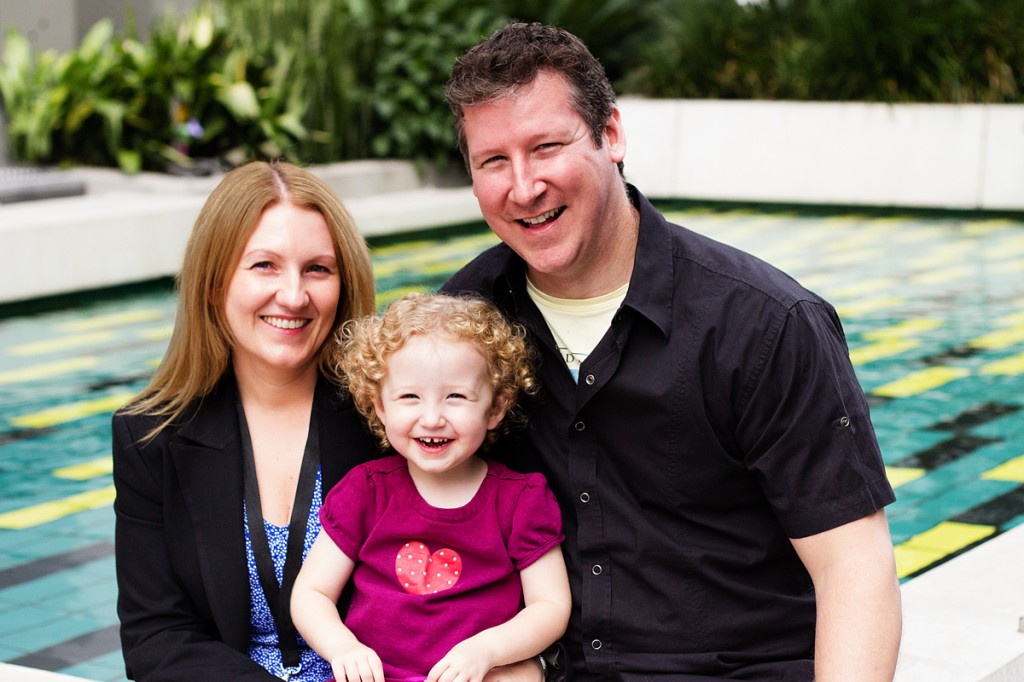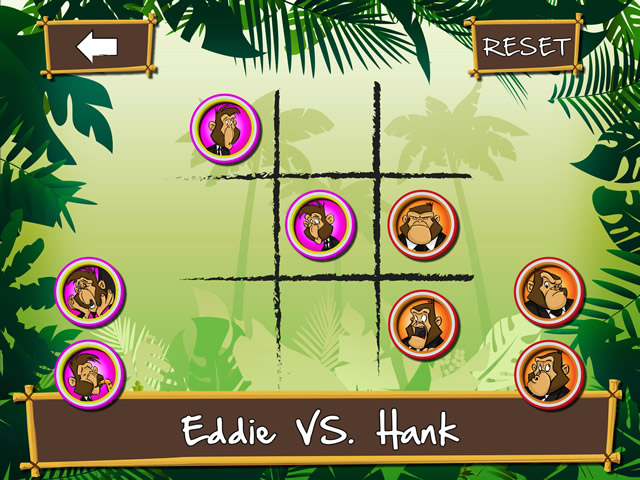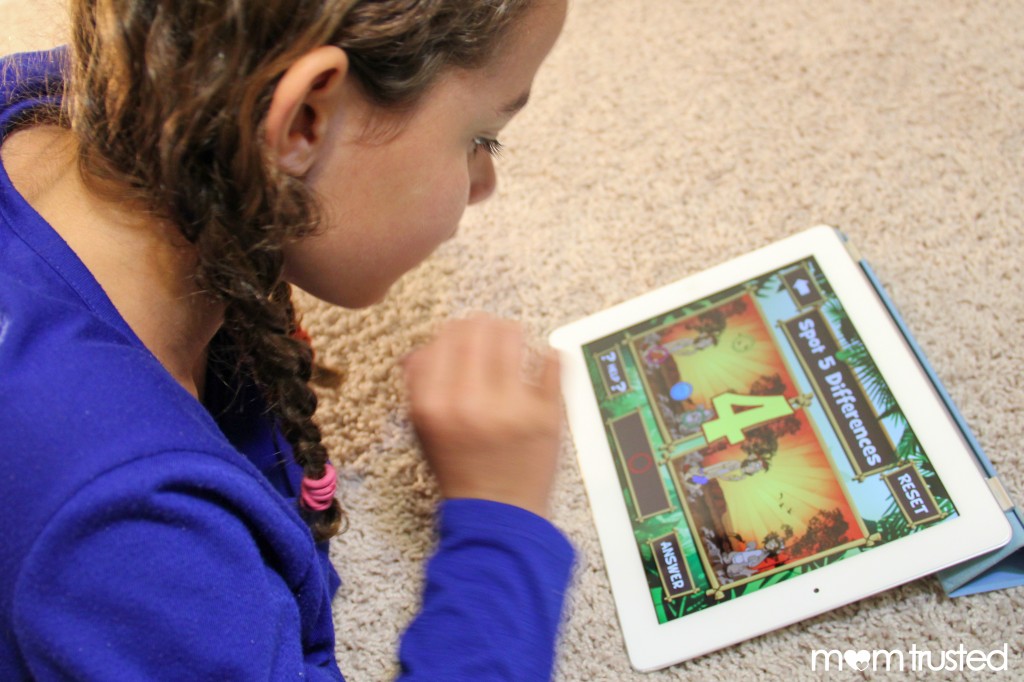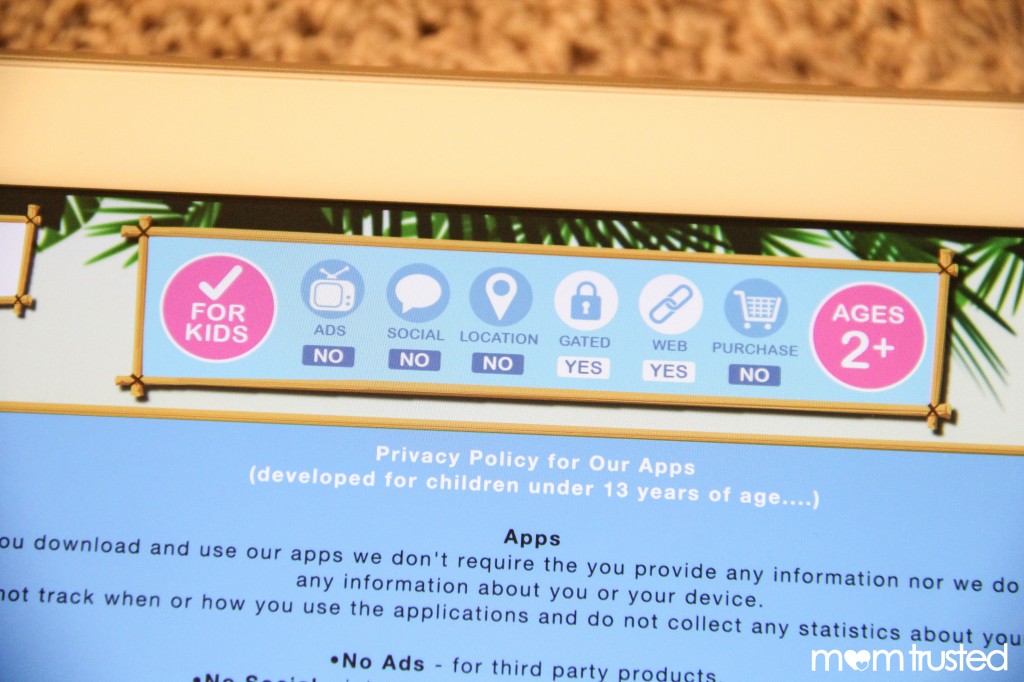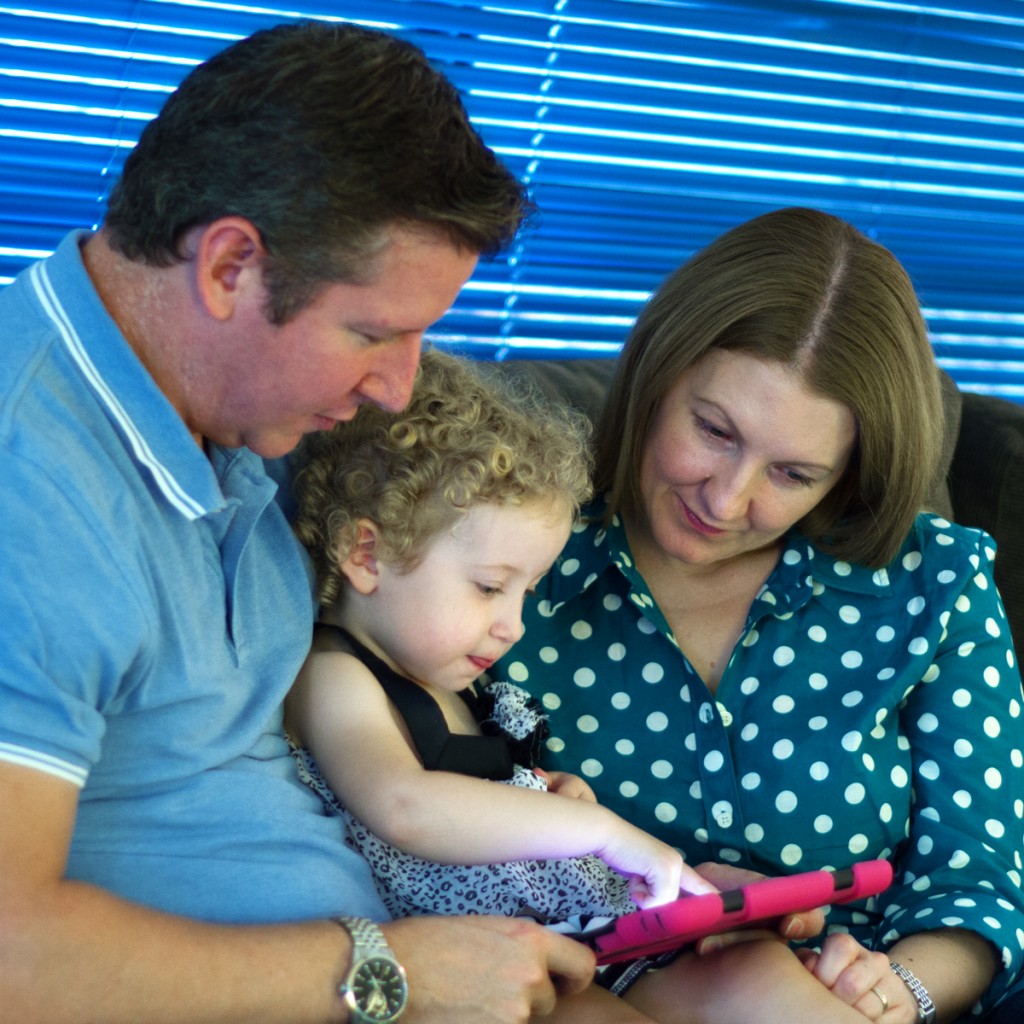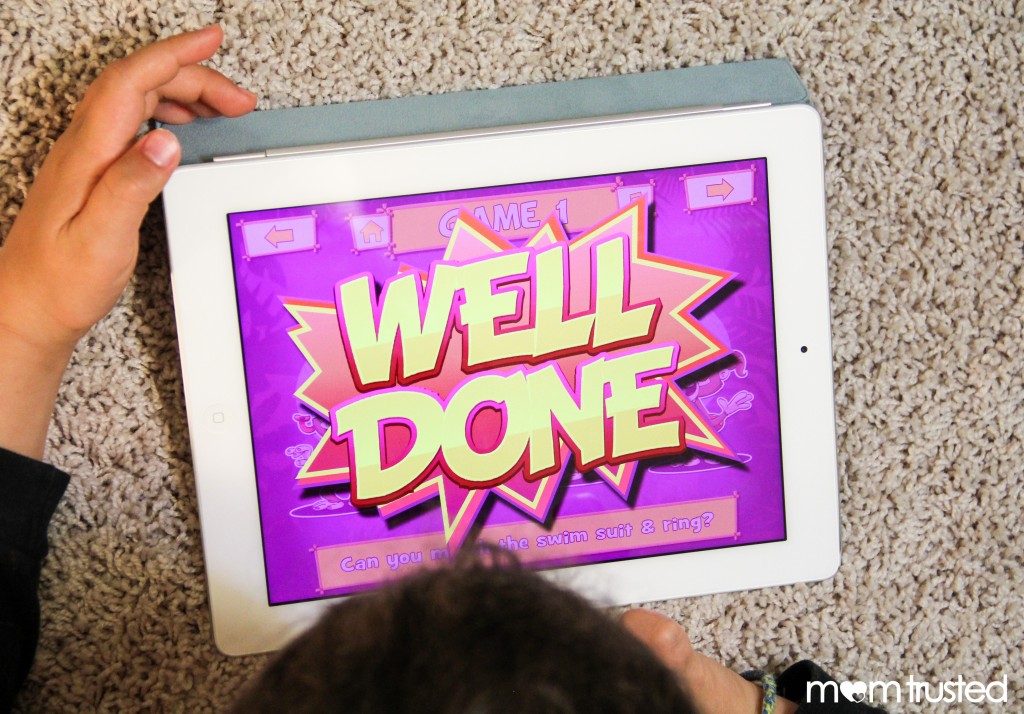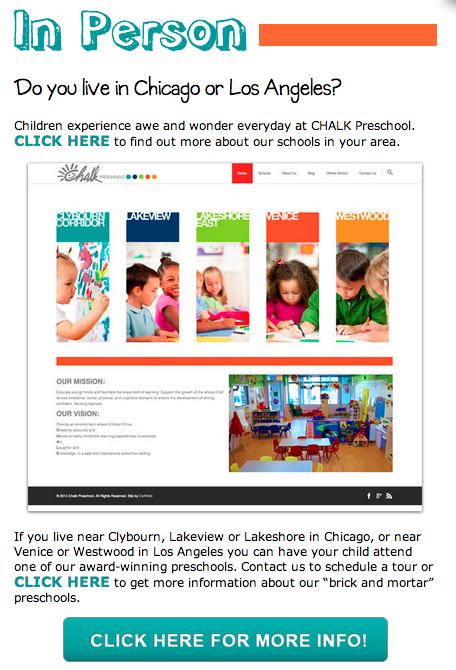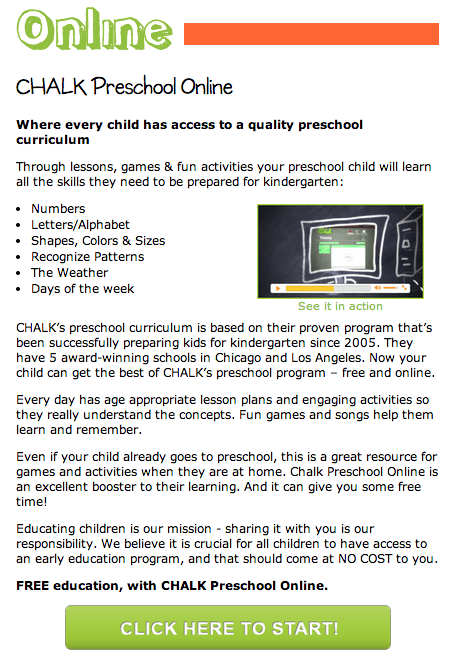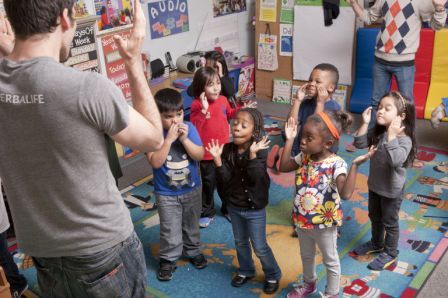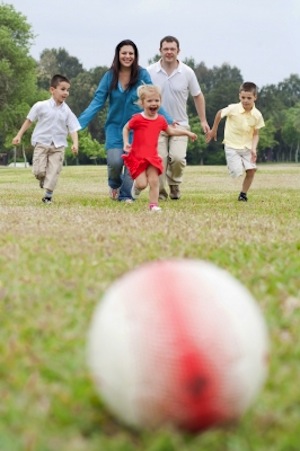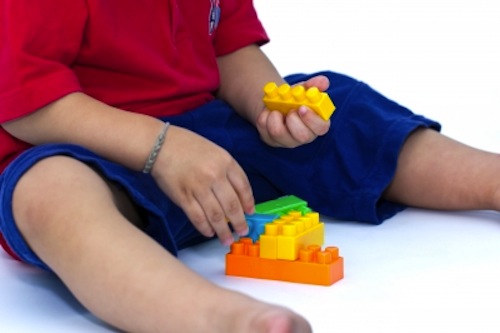Twisted Logic: Brain Boosting Apps for Kids
New app producer Twisted Logic produces one-of-a-kind gaming apps for kids of all ages. The small company is family-run and clearly a passion project, based on the business smart and tech savvy husband and wife team. Together, they create fun, interactive apps that cater to learning as much as they inspire a good time.
So far, Twisted Logic has released three apps, all compatible with iOS and Android products. Their released gaming apps include:
- Monkey Match: Monkey Match is a matching and memorization game with lively illustrations. It helps kids learn by matching shapes, colors, sounds and more. Plus, every level is goal-oriented. It establishes a goal at the beginning of the level and rewards the player after the goal is obtained, all in all making for an engaging game. [itunes download] [android download]
- Monkey Spot the Difference: Monkey Spot the Difference helps little ones hone in on their observation and concentration skills. They look at two images and must compare and pick the differences out of each one. It’s a great game to play with the whole family. [itunes download] [android download]
- TicTacToe Monkeys: TicTacToe Monkeys gives the classic game a fun twist. Players must choose their winning monkey and then duke it out on the Tic Tac Toe board. This game of strategy definitely puts a cute twist on the classic we all grew up playing. It’s a game for all ages. [itunes download] [android download]
In addition to creating fun and educational games, Twisted Logic wants you to feel good about letting your child on their apps. So far the company sticks to an internet safety code for their kids apps that leaves us wanting more from our other kids apps. When downloading you can be sure there are:
- NO In-App Purchases
- NO Third-Party Ads
- NO tracking or collection of user data
- NO requests for personal information
- NO links to the web or social networks without entering a Parent Gate
The creative geniuses behind Twisted Logic make up quite a team. The Head Creator is a creative tech guru who tapped his passion for animation and design and turned it into colorful, creative gaming apps. The Chief Strategist heads the business end of the company, making business-savvy decisions and making sure the company and its workers stay on track. The best part? This family-run business knows exactly what kids want because their daughter Mackensie is the “Senior App Tester” for the company. Her bio reads, “From about the age of 10 months Mackensie has been learning the ins and outs of Apple devices. Currently having her own iPad and two iphones (handed down from Dad) isn’t good enough and she’s always after Dad’s newer devices. Now at the age of 2 years old, finding her way around mobile devices is a breeze. She can even teach her Mum a thing or two…”
Twisted Logic brings creative, colorful apps to the market, developed in a family environment and tested by their own daughter and family friends. This team knows what kids and parents want in an app! Download these apps today!
CHALK Preschool: In-Person or Free Online Options for Early Education
CHALK Preschool is one of the most technologically advanced early education programs of its time. Its online program is totally convenient and totally free. If parents prefer a more traditional, in-person option for their child, they’re invited to opt into one of CHALK’s five in-person preschools, located in Chicago and Los Angeles.
The CHALK Preschool Mission
CHALK Preschool believes that every child deserves access to an early education. That’s why, in addition to offering several in-person locations in both the Chicago and Los Angeles areas, it’s also available to preschoolers around the world through CHALK’s online preschool program. And because CHALK knows how vital those first few years of learning are, it offers its online curriculum for free.
CHALK’s Teaching Philosophy
Teachers at the in-person centers believe in a warm, welcoming environment where children learn by embracing the arts and achieving classroom goals, based on studied learning standards. CHALK focuses primarily on a hands-on learning style. Even the online courses are about much more than screen time. This hands-on teaching approach means preschoolers learn both inside and outside, with both the online and in-person options. The curriculum focuses on primary learning objectives centered on literacy, math and science. But CHALK goes beyond the books. Preschoolers in the program hone their creative skills through art projects and perfect motor skills through music and dance activities.
The Nitty Gritties of CHALK
The online courses are available on regular computers, as well as on smartphones and tablets. While age varies, based on the needs of each individual child, most are ready to join the preschool program somewhere between the ages of two and five. While they’re first separated into classes by age, if a parent feels it’s not a perfect fit, staff members are happy to switch children to more suitable class groups.
CHALK’s History
The idea for CHALK was first established in 2004, but the first center went up in Illinois the following year. For the next few years, more and more centers were opened in the Chicago area and in 2009, the first Los Angeles CHALK Preschool was established. Since then, the centers have continued to multiply in both cities. Because the founders of CHALK wanted their preschools to reach across the country, and even the world, they decided to launch the online preschool option. With this digital curriculum, even those who don’t live in Chicago or Los Angeles can still reap the benefits of a CHALK early education.
Parents are welcome to enroll their child in the online program at any time, simply by visiting CHALK Preschool’s website. In-person programs accept applicants year-round, so Chicago and Los Angeles-based families are also welcome to enroll at any time.
UPDATE 1/26/15: CHALK’S FREE SITE IS NOW AVAILABLE AT WWW.FREEONLINEPRESCHOOL.COM
Tips for Preparing Your Child for Summer Camp
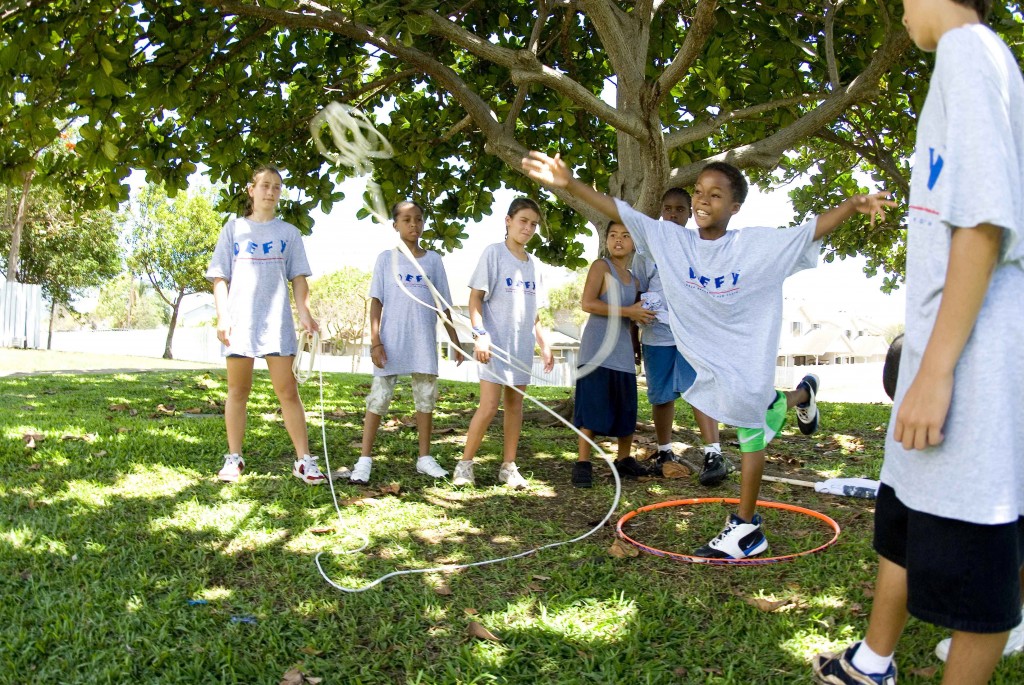
Not only is summer camp a good option for keeping kids busy, active and learning over the summer after school has wrapped up, but it could also set positive habits for the rest of their lives. Psychologists have found that sending kids to summer camp may make them less affected by stress as they mature. Camp helps kids form new relationships with new friends and learn from different adults. They learn to cope with unfamiliar situations and learn handle the unexpected. But sometimes experiencing a large shift in routine takes a bit of getting used to. Help make the transition smoother with these tips for preparing your child for summer camp:
Make a checklist
With so many things to remember, especially if your child is heading to overnight camp, it’s good to write everything down. Most camps offer their own checklists so that parents know exactly what to pack. Make sure you get this ahead of time, or write out your own if the camp doesn’t have one available. That way, you’ll have plenty of time to go out and buy any missing must-haves.
Include your child in the packing process
Often, kids feel less stressed about change when they know the fine details. Allowing your little one to help you pack can give them some added insight into what’s going on. That way, they’ll feel involved and know exactly what’s coming with them and what to expect.
Buy special camp supplies
Anything shiny and new will add to the thrill of summer camp. Maybe that means a new swimsuit or a brand new backpack in their favorite color. Then, tell them they can use their new gear as soon as camp begins and have them hold off to add a bit of positive anticipation.
Get excited about camp!
The whole point of summer camp is to have fun, right? Make sure your little one knows this! Talk about all the new friends they’re going to make. Mention some of the cool activities they get to do (think swimming, games, crafts, etc.). Often, getting excited about something washes the jitters away for both the parents and the child.
Leave quickly
When the drop-off date finally arrives, do it quickly like ripping off a band aid, even if they’re only headed to a day camp and you’ll see them that night. Waiting around can make too big of a deal out of your departure, giving them a chance to think about what’s happening and get nervous. Plus, if you stick around too long, they might pick up on the sense that you’re nervous too. Make it easier for both of you by dropping them off with a big smile and waving goodbye.
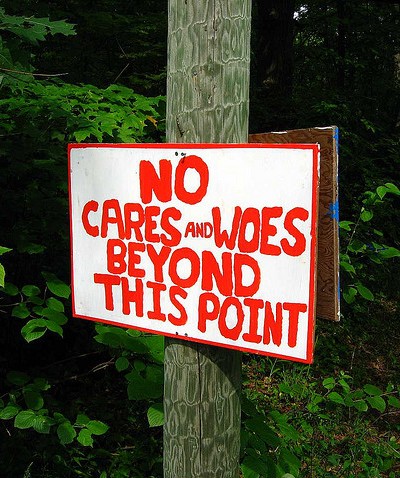
Still looking for the perfect fit for this summer? Search for a great one near you now!
Sources:
-“Camp Prep” She Knows
-“Summer Camp Makes Kids Resilient” Psychology Today
-“Prepare Your Child and Yourself for Camp” American Camp Association
– Photo credit: United States Navy & Peter Blanchard
Arts Based Early Education
As a substitute teacher, I sure have encountered a lot of different education programs. I’ve been at big and small schools, public and private, and have taught early education through high school. While a one-off day at a school is usually quickly forgotten, getting to see (and briefly be a part of) a really impressive program is a treat!
Recently, I spent the day teaching for the Kaleidoscope Program at Settlement Music School in Philadelphia. My background (and my heart) is in Art Education, so I jump at any chance to work in an arts based early education environment – especially an award winning community based school in my own hood!
Throughout my day, I was excited to see young kids (pre-K) who were really getting a well rounded arts education! The kids in my art classes had obviously been exposed to the “elements of design”, and were comfortable with some fairly advanced color theory. The day I spent with them, we were working with hot and cool colors. The students definitely had both the knowledge and vocabulary to talk about their own and others’ art work.
I was also able to observe the Kaleidoscope Plus program, Settlement’s new after-school program. Much like the day program, Kaleidoscope Plus has a major focus on the arts – visual arts, music, theater and dance. In my experience, there are some major benefits to presenting art, music, and movement in an integrated curriculum. Students gain skills in all areas – learning principles of art, developing fine motor skills, enhancing their listening skills and music making abilities, and moving their bodies in controlled and intentional ways.
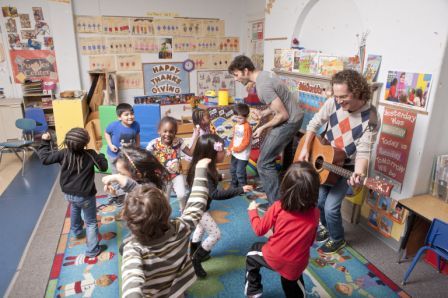
Above, students are enthusiastically engage in a game of “Freeze Dance Party “ – accompanied by live music! Even some of the shyest kids were socializing in this dance game!
This cross-disciplinary approach allows broader topics and themes to be explored. Over the course of this school year, Kaleidoscope Plus kids will be learning and creating around three major themes – myself, my community, my world. While I was visiting, students we’re focusing on “myself”. In the choice-based art classroom, this meant learning about our bodies and making a larger-than-life skeleton. (I do love a good 3-d project!)
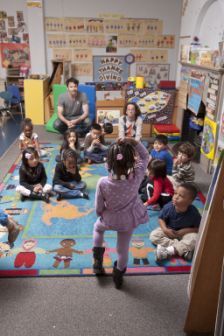
On the more “dramatic” side of things, kids learned about storytelling, which culminated in mini-performances to rapt audiences of their peers. It’s obvious that these guys are confident in front of a group!
Here, kids participate in favorite game “mirror” – learning about the expressions they can make with their faces.
Overall, it was charming and fun to spend an afternoon with kids that were really learning – while not losing sight of the main focus: play. It was awesome to see kids really interacting, creating, and expressing themselves all afternoon. I found myself wishing I had been in a program like this when I was that little!
More information on Kaleidoscope Plus (including their mission statement, and enrollment pages) is available here. You can still enroll or start in January, after the holidays!
Family Fitness: Staying Fit as a Family
Looking for a fresh start to 2014? What could be better than working on your family fitness by spending some quality together? Here are some family friendly activities that involve exercise, but are guaranteed to be more fun than the gym:
Bike
Grab everyone in the family a bike and set off on a two-wheel adventure. If your kids haven’t mastered the balancing technique yet, throw on some training wheels. And if your little one is way too little to pedal on his or her own, invest in a bike with a child seat or a child trailer so even the smallest munchkins can join in on the fun. Plus, you don’t just have to bike on adventures. You can use your new wheels for running errands too.
Take a hike
Let your little ones lose in the great outdoors. Go on a backpacking trip together. If you just go for a night or two, you shouldn’t need too much gear, but should be able to explore beautiful sites while staying active. If you’re worried about your little one on the path, consider a baby carrier to strap to your chest or just taking a day hike.
Play ball
It doesn’t matter if it’s soccer, football, baseball or any other sport. The point is that you’re all moving and having fun as a family. Get out in your back yard and throw a ball around. Invite neighborhood families too! The bigger the teams, the better.
Dance
Little ones love to boogie so throw a dance party in your own house. Crank up the music, get dressed up and get down.
Sources:
-“7 Family Exercise Activities.” Life Script
-“Making Fitness a Family Affair.” Great Schools
-Photo courtesy of photostock/freedigitalphotos.net
Educational Activities for Children with Down Syndrome
Children with Down syndrome develop at a slower rate than most children without Down syndrome. They face challenges, such as being slower to learn how to talk and care for themselves. This certainly doesn’t mean these things are impossible. They just take a bit longer and some extra dedication. Here are some fun, educational activities for children with Down syndrome that will help make learning fun and a little less frustrating for little ones.
Use visuals to learn sounds.
Often, visual learning works best for children with Down syndrome. Sometimes, sign language can help little ones communicate and learn verbal language. You can either learn actual sign language or invent your own. For example, maybe touching the mouth represents hunger.
Take turns.
Teaching a child with Down syndrome to take turns can amplify learning experiences. Communication relies heavily on taking turns, having a listener and a speaker, but sometimes this concept doesn’t come naturally. Demonstrating this turn taking and even verbally communicating “OK now it’s my turn” can help the learning process happen a bit faster.
Use repetition to your advantage.
Studies show that kids with Down syndrome usually need at least a 100-word vocabulary before they start transitioning from one-word statements to multi-word thoughts. Repetition can help accelerate learning to speak. Think of it as an add-on game. If the child says, “Car,” say, “Car. Fast car.”
Sources:
-“Down Syndrome” Kids Health: http://kidshealth.org/kid/health_problems/birth_defect/down_syndrome.html
-“12 Booster Activities for Kids with Down Syndrome” Parents.com: http://www.parents.com/health/down-syndrome/booster-activities-for-kids-with-down-syndrome/
-“Down Syndrome Learning Activities” Pinerest: http://www.pinterest.com/trudycallan/down-syndrome-learning-activities/
-“Top Five Instructional Strategies for Students with Down Syndrome” Special Ed Post: http://specialedpost.com/2013/01/31/top-five-instructional-strategies-for-students-with-down-syndrome/
-Photo courtesy of kdshutterman,/freedigitalphotos.net
Play Based Learning
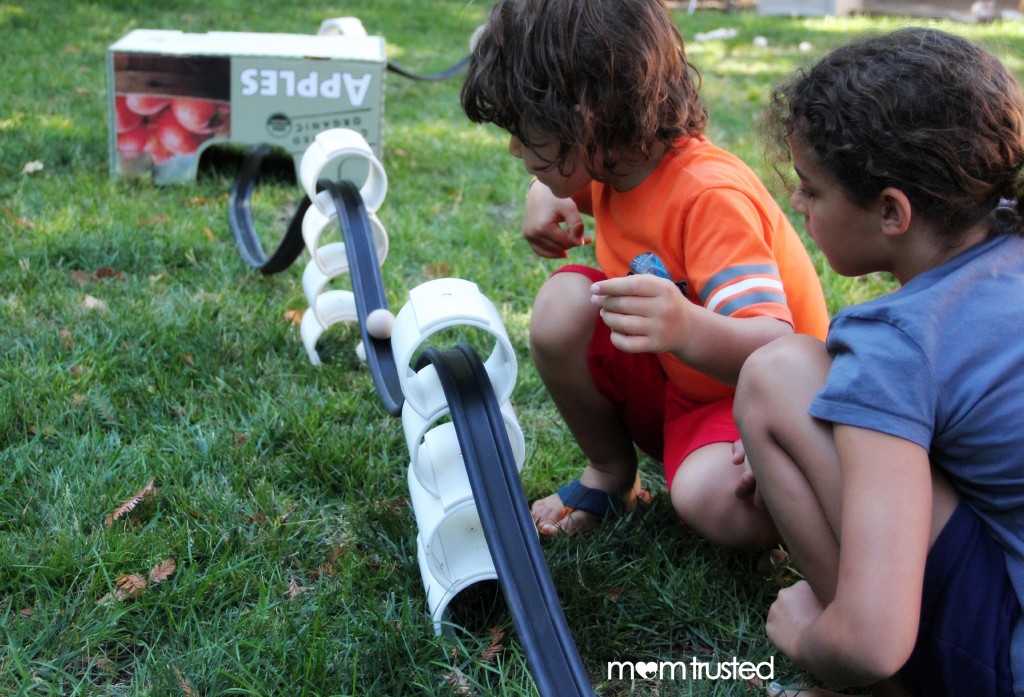
As teachers, care providers and parents, you know better than anyone that kids learn best through hands-on or play based learning. Our friends at Kodo Kids know that hands-on play is not only extremely educational, but also the most fun way to learn. That’s why they produce products that promote investigation and exploration.
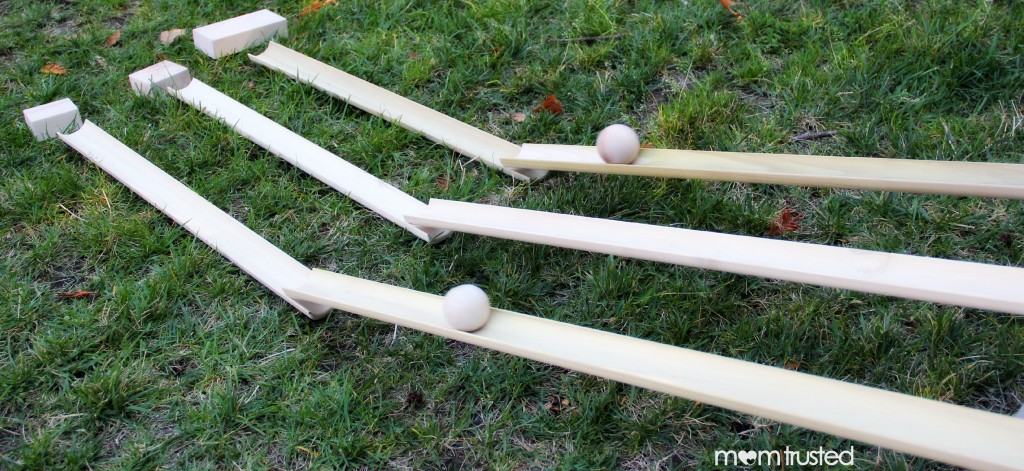
As childhood expert Bev Bos would say, “If it’s not in the hand, it’s not in the head.” At Mom Trusted, we agree with Kodo Kids’ learning philosophy. Open-ended play is an important learning style for children of all ages. It helps create a deep understanding of the material introduced to them. This hands-on, play approach is especially important during early education, when children are just starting to discover and create their learning style, along with the world around them.

Products from Kodo Kids range anywhere from Digger Kits, designed to encourage outdoor play and learning by digging, burying and sifting through sand and soil, to Kodo Clay, an all-natural product meant for art and expression. There’s a magnetic filling kit that teaches kids about magnetism and iron particles. Kodo Kids even has Pump Works, a kit of water tubes that lets children test out their engineering and water pumping skills.

How do we know Kodo Kids’ products are great? They sent us some and we loved them! With a wide variety of tools, toys and gadgets, any teacher, child care provider, or parent is sure to find something right up their alley that suits their individual teaching or parenting style. Visit Kodo Kids’ products for yourself today to see just how great hands-on learning can be!
